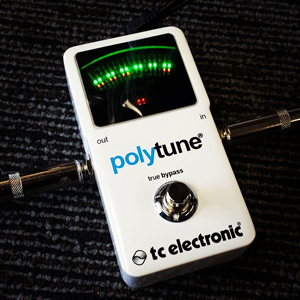Audio Engineer's take on the tc electronic Polytune2 tuner
Posted: 15 September 2014
Synopsis: Having seen a few guitar tuner pedals over the years, with many handling the rigours of the road less successfully than those that used them, I was naturally intrigued when the TC Polytune started appearing on pedal boards. At first, I thought the pedal w

| Having seen a few guitar tuner pedals over the years, with many handling the rigours of the road less successfully than those that used them, I was naturally intrigued when the TC Polytune started appearing on pedal boards. At first, I thought the pedal was a gimmick, another product with flashy lights, in an attempt to justify a price tag above the other tuners on the market. Two or three years later, these same polytune pedals are still firmly mounted on these same guitarists pedal boards, instigating my comment to one fella " ah, i see you've gone with the same tuner again", to which he replied "nah man, its still the same one i bought a couple of years ago"! |  |
So, perhaps it is true, these Polytune's do last longer than other tuners around. I have to admit, I am yet to hear a TC Polytune fail. From vantage point at monitors, or at Front of House mix position, I have not been able to detect any signal loss, or alteration to the colour or tone of the guitar with the Polytune in the chain. I suggest this may have something to do with the usual high standard TC Electronic maintain in their products. With the real "true bypass" mechanism TC Electronics install in the pedal, the actual signal from guitar to passes to the amp. effects loop or DI unimpeded when the switch is engaged.
Back to those flashing lights though, surely its just a gimmick, right? WRONG! Today in the SWAMP office, I took it upon myself to try out the re- issue released by TC Electronic - the Polytune 2. With a yet to be set up electric guitar in hand, and a headstock tuner in place for comparison, I strummed away, firstly a chord, and then each individual string. Immediately apparent was the accuracy produced by the tuner, in some case, where the headstock tuner indicated correct tuning, the Polytune detected the smallest deviation, and alerted me with a red line, slightly on the flat side. This happened to a few other strings as i continued. Once completed tuning, I strummed a few chords, gave the strings a bend, and returned to my starting chord, only to find it was slightly out of tune. Remarkably, the Polytune-2 detected which string had fallen out of tune, and whether it was flat or sharp! So whilst holding the chord, i was able to slip the offending string back into tune, without interrupting the progression.
Now i know why guitarists playing live like this pedal. It's accurate, and smart, and easy to see when strings pop out of tune! I guess this may also be a great tool to check intonation of your guitar as you move up and down the neck, either chording or soloing. Whatsmore, repeating the same test with bass and acoustic guitar, exactly the same reaction of the Polytune-2 was recorded.
If I still played guitar live, I would certainly pick one of these up. They are NOT a gimmick. The TC Polytune-2 is the real deal as far as tuner's are concerned. Finally it seems, there is an accurate and durable tuning pedal fit to belong on a guitarist's pedal board for years to come.
Written By Stu Marks - Audio Engineer and SWAMP Account Manager.






